Filter by
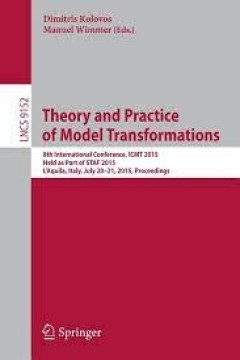
Theory and Practice of Natural Computing Fourth International Conference, TP…
This book constitutes the refereed proceedings of the 4th International Conference on Theory and Practice of Natural Computing, TPNC 2015, held in Mieres, Spain, in December 2015. The 12 revised full papers presented together with 20 invited talks in this book were carefully reviewed and selected from 30 submissions. The scope of TPNC is rather broad, containing topics of either theoretical,…
- Edition
- -
- ISBN/ISSN
- 978-3-319-26841-5
- Collation
- 53 illustrations in colour
- Series Title
- -
- Call Number
- -
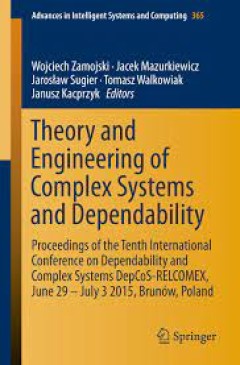
Theory and Engineering of Complex Systems and Dependability Proceedings of t…
Building upon a long tradition of scientifi c conferences dealing with problems of reliability in technical systems, in 2006 Department of Computer Engineering at Wrocław University of Technology established DepCoS-RELCOMEX series of events in order to promote a comprehensive approach to evaluation of system performability which is now commonly called dependability. Contemporary…
- Edition
- -
- ISBN/ISSN
- 978-3-319-19216-1
- Collation
- 221 b/w illustrations
- Series Title
- -
- Call Number
- -
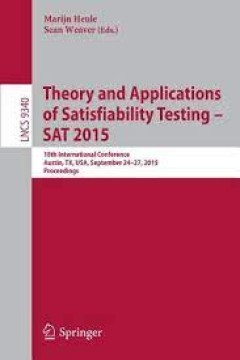
Theory and Applications of Satisfiability Testing -- SAT 2015 18th Internati…
This book constitutes the refereed proceedings of the 18th International Conference on Theory and Applications of Satisfiability Testing, SAT 2015, held in Austin, TX, USA, in September 2015. The 21 regular papers, 2 short papers and 7 tool papers presented together with 3 invited talks were carefully reviewed and selected from 70 submissions. The papers address different aspects of SAT, includ…
- Edition
- -
- ISBN/ISSN
- 978-3-319-24318-4
- Collation
- 94 illustrations in colour
- Series Title
- -
- Call Number
- -
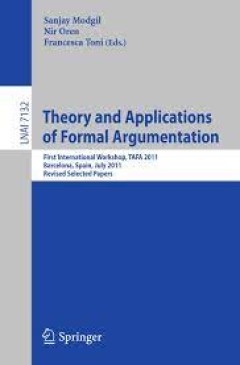
Theory and Applications of Formal Argumentation
This book constitutes the refereed proceedings of the Third International Workshop on the Theory and Applications of Formal Argumentation, TAFA 2015, held in Buenos Aires, Argentina, in July 2015. The workshop was co-located with IJCAI 2015. The 15 revised full papers presented were carefully reviewed and selected from 25 submissions. The papers deal with formal theoretical models of argumentat…
- Edition
- -
- ISBN/ISSN
- 978-3-319-28460-6
- Collation
- 48 illustrations in colour
- Series Title
- -
- Call Number
- -
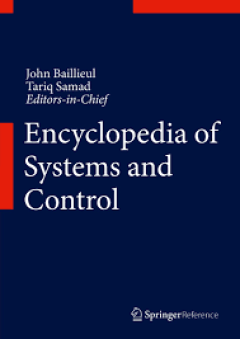
Encyclopedia of Systems and Control
The Encyclopedia of Systems and Control collects a broad range of short expository articles that describe the current state of the art in the central topics of control and systems engineering as well as in many of the related fields in which control is an enabling technology. The editors have assembled the most comprehensive reference possible, and this has been greatly facilitated by the publi…
- Edition
- -
- ISBN/ISSN
- 978-1-4471-5058-9
- Collation
- 185 b/w illustrations, 231 illustrations in colour
- Series Title
- -
- Call Number
- -
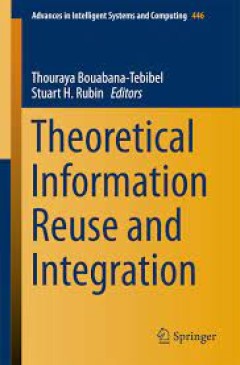
Theoretical Information Reuse and Integration
Information Reuse and Integration addresses the efficient extension and creation of knowledge through the exploitation of Kolmogorov complexity in the extraction and application of domain symmetry. Knowledge, which seems to be novel, can more often than not be recast as the image of a sequence of transformations, which yield symmetric knowledge. When the size of those transformations and/or the…
- Edition
- -
- ISBN/ISSN
- 978-3-319-31311-5
- Collation
- -
- Series Title
- -
- Call Number
- -

Encyclopedia of Planetary Landforms
This encyclopedia provides a snapshot of our current geological knowledge on solid-surface Solar System bodies. Each entry contains information about the features’ morphology, its interpretation, proposed formation models, distribution and occurrence, planetary or terrestrial analogs, and research history. The entries are fully referenced. All image captions include original image IDs. More …
- Edition
- -
- ISBN/ISSN
- 978-1-4614-3134-3
- Collation
- 1287 b/w illustrations, 575 illustrations in colour
- Series Title
- -
- Call Number
- -
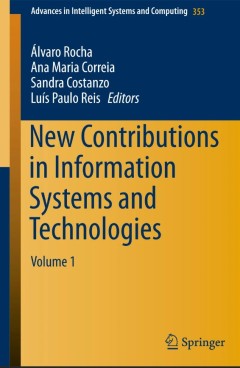
New Contributions in Information Systems and Technologies:Volume 2
This book contains a selection of articles from The 2015 World Conference on Information Systems and Technologies (WorldCIST'15), held between the 1st and 3rd of April in Funchal, Madeira, Portugal, a global forum for researchers and practitioners to present and discuss recent results and innovations, current trends, professional experiences and challenges of modern Information Systems and Tech…
- Edition
- 1
- ISBN/ISSN
- 978-3-319-16527-1
- Collation
- XXII, 398
- Series Title
- Advances in Intelligent Systems and Computing
- Call Number
- -

New Advances in Information Systems and Technologies Volume 2
This book contains a selection of articles from The 2016 World Conference on Information Systems and Technologies (WorldCIST'16), held between the 22nd and 24th of March at Recife, Pernambuco, Brazil. WorldCIST is a global forum for researchers and practitioners to present and discuss recent results and innovations, current trends, professional experiences and challenges of modern Information S…
- Edition
- 1
- ISBN/ISSN
- 978-3-319-31306-1
- Collation
- XXIV, 773
- Series Title
- Advances in Intelligent Systems and Computing
- Call Number
- -
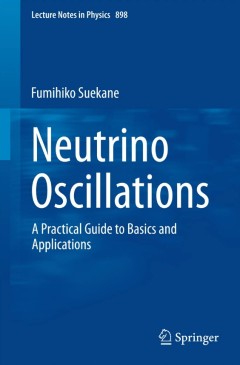
Neutrino Oscillations:A Practical Guide to Basics and Applications
Neutrino oscillation (N.O.) is the only firm evidence of the physics beyond the Standard Model of particle physics and is one of the hottest topics in elementary particle physics today. This book focuses on the N.O., from its history to the future prospects, from the basic theories to the experiments.Various phenomena of N.O. are described intuitively with thorough explanations of the fundament…
- Edition
- 1
- ISBN/ISSN
- 978-4-431-55461-5
- Collation
- XIV, 185
- Series Title
- Lecture Notes in Physics
- Call Number
- -
 Computer Science, Information & General Works
Computer Science, Information & General Works  Philosophy & Psychology
Philosophy & Psychology  Religion
Religion  Social Sciences
Social Sciences  Language
Language  Pure Science
Pure Science  Applied Sciences
Applied Sciences  Art & Recreation
Art & Recreation  Literature
Literature  History & Geography
History & Geography